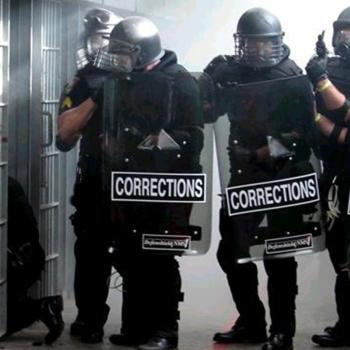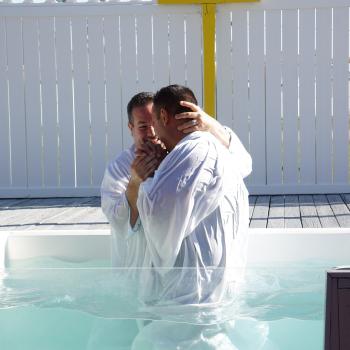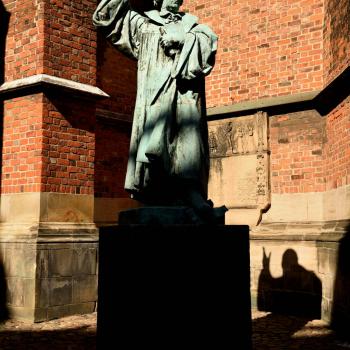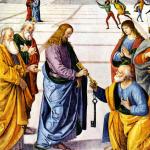Regensburg, Germany, Dec 17, 2015 / 03:15 pm (CNA/EWTN News).- The Bishop of Regensburg spoke out against “gender theory” in a homily recently made available in English – chastising the German bishops' conference for presenting the idea “as being basically compatible with Catholic belief.” Celebrating the feast of St. Wolfgang, who was Bishop of Regensburg from 972 to 994, Bishop Rudolf Voderholzer taught in an Oct. 31 homily that gender theory – the idea of separating biological sex from gender – does not contribute to equality, and is ultimately a denial of nature and the goodness of creation. It puts at stake the essence of man and woman, denying their nature as potential fatherhood and motherhood. A bishop's pastoral ministry, he said, “includes the duty and the responsibility to act as a guardian, to raise his voice, as necessary, to draw attention to discrepancies or errors, however convenient or inconvenient this may be.” “Recently, just such a necessity has again arisen.” Bishop Voderholzer noted that the German bishops' conference published a flyer in late October which “was written to declare these theories as being basically compatible with Catholic belief, in contrast to an extreme form of gender mainstream, and it claims to be formulating the Catholic position on this issue.” “In my opinion, the former appears impossible – finally, there is no such thing as 'gender light'. The concept lowers the drawbridge and opens the gate to positions irreconcilable with the Christian faith. And the flyer not only fails to present the Catholic position, it leaves it out completely.” The bishop also noted that the publication “was released in the name of the Conference of Bishops, of which I am a member, without my having previously seen its content, much less having approved it.” He made three points on his opposition to the flyer, saying it “fails to mention the basic opposition between gender theories and the Christian belief in creation”; it pretends that “gender theories were an important contribution in service of the equality of all men, while the hostility such theories express towards divine creation is merely attributable to the exaggerations of a small minority”; and that it “fails to mention to the reader the large number of Church statements regarding gender theories, although there is no shortage of them.” Bishop Voderholzer stated that “anyone who commits himself to justice between the sexes or to the protection of man’s dignity has me at his side,” and that the Church cares for all human persons “independent of their age, sex, background and sexual orientation. The concern even applies to man prior to birth and in every situation and phase of life.” “But the gender debate is not about all of that,” he said. “Gender theoreticians use the equality issues in order to introduce in society a notion of man that goes far beyond specific concerns of equality and, finally, paradoxically, leads to the dissolution of that which ought to be protected, specifically the intrinsic value of male and female existence. The gender theory implies a denial of the nature of man and woman and, hence, also the exclusion of the belief in God, the good Creator.” The bishop distinguished between culturally-assigned roles and the essence of sex differentiation, noting that “of course men can also iron shirts, wash dishes and change diapers. And women can also park cars, become chancellor and change tires. This is not just a question of what is supposed to be 'typically female' and what is considered 'typically male'. This pertains to what is essential.” “The excessive differentiation, in extreme cases, the separation of biological and social gender, is the basic error of gender theory.” Bishop Voderholzer taught that “the essence of man and woman is the potential to become a father and the potential to become a mother, respectively. These are not exchangeable roles, but rather gifts from the Creator, and, in the last instance, a calling.”There is no such thing as 'gender light'. The concept lowers the drawbridge and opens the gate to positions irreconcilable with the Christian faith. The potential for motherhood orients a woman's physical existence, her hormones, her physicality, he noted, adding that this remains true even “ if she lives single and remains childless because she has perhaps decided to follow Christ in a religious order, decided in favor of spiritual motherhood.” Gender theory's “underlying message,” he said, “is the repudiation of the order of creation” and its goodness. “It is not only an excessive demand but rather a completely senseless endeavor to want to select one's gender instead of accepting and cultivating the sex given to you at birth.” The bishop emphasized that the Church wishes to help people to live in accordance with their nature. “Nobody is condemned for having difficulties accepting his biological gender,” he said, “but then someone has to help them to accept their masculinity and their femininity. This is not surgically possible, it is only possible with human and pastoral care.” The process of maturation “can only be successful with nature, not against it!” he reiterated. He quoted Bishop Stefan Oster of Passau, and added that “one can do without the concept 'gender' altogether, because, like a Trojan horse, the concept, finally, opens the door to anti-creation theories, that are related to it everywhere. Again: There is no such thing as a 'gender light' version.” Bishop Voderholzer concluded by noting the variety of popes and bishops who have spoken out against gender theory, saying the German bishops' conference's flyer “grandiosely claims to present the Catholic position in the question. But it fails to include the many statements on the subject issued by bishops and the Pope.” He began by noting five separate instances in which Pope Francis has spoken against gender theory, including his June 8 ad limina address to the Puerto Rican bishops, where he said: “Allow me to call your attention to the value and beauty of marriage. The complementarity of man and woman, the pinnacle of divine creation, is being questioned by the so-called gender ideology, in the name of a more free and just society. The differences between man and woman are not for opposition or subordination, but for communion and generation, always in the 'image and likeness' of God. Without mutual self-giving, neither one can understand the other in depth.” The bishop then quoted from Benedict XVI's 2012 Christmas greetings to the Roman Curia, in which he said that “people dispute the idea that they have a nature, given by their bodily identity, that serves as a defining element of the human being. They deny their nature and decide that it is not something previously given to them, but that they make it for themselves … The manipulation of nature, which we deplore today where our environment is concerned, now becomes man’s fundamental choice where he himself is concerned.” Bishop Voderholzer then referred to the final report of the Synod on the Family, published Oct. 24, which called gender ideology “a very important cultural challenge” to the family and said that “According to our faith, the difference between the sexes bears in itself the image and likeness of God.” “It is clear words such as these that are absent in the flyer that I have criticized,” said Bishop Voderholzer. “And, indeed, they might have quoted German bishops as well, instead of omitting them.” His first example was Archbishop Ludwig Schick of Bamberg, who in 2005 said that gender theory “only allows man and woman, fatherliness and motherliness, to be defined as products of education and socialization. Hence, it is fundamentally wrong.” He also pointed to Bishop Heinz Algermissen of Fulda, who in a July homily “described gender theory as an ideology that completely opposes reality and the integrity of human nature.” Bishop Voderholzer concluded his homily by saying that “as a bishop who has accepted the torch of belief and pastoral responsibility from his forerunners, including Saint Wolfgang, I cannot, and may not, keep quiet on this subject, and I call upon you to add your voice to mine in this dispute so that the biblical image of man in its entire radiance and depth can also provide orientation to young people of our time in particular.” Read more


















